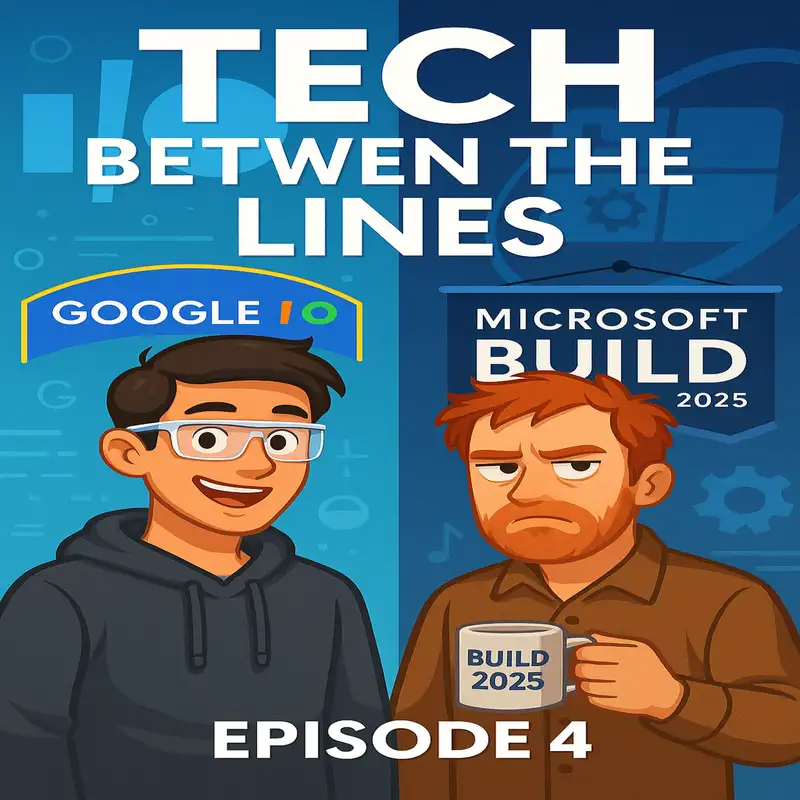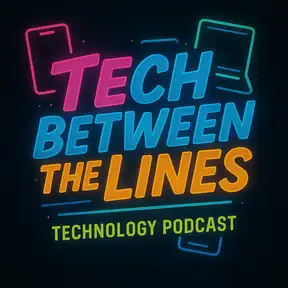
AI Avalanche: Google I/O and Beyond
Summary
In this episode of Tech Between the Lines, the hosts dive into the latest tech news, covering major announcements from Google I.O. 2025, Microsoft Build 2025, Apple's upcoming WWDC 2025, and Nvidia's AI Factory supercomputer. They discuss the implications of new software updates, AI advancements, and the competitive landscape among tech giants, providing insights and predictions for the future of technology.TakeawaysThe latest Android 16 beta features a refreshed Material 3 design.Google's Gemini Ultra aims to enhance subscription services with AI.Microsoft's Copilot AI is integrating into Windows 11 and Office 365.Visual Studio's new AI features are designed to save developers time.Apple's WWDC 2025 is expected to showcase significant updates for iOS and Vision OS.Nvidia's AI Factory supercomputer is engineered for next-gen AI workloads.The competition between Google and Microsoft is intensifying in the AI space.Wearable technology is still struggling to gain mainstream traction.Accessibility improvements in tech are becoming increasingly important.The excitement around new tech often comes with cautious optimism.Chapters00:00 Welcome and Introduction to Tech News01:11 Google I.O. 2025 Highlights03:00 Microsoft Build 2025 Insights06:02 Apple's Upcoming WWDC 202506:55 Nvidia's AI Factory SupercomputerSpeaker 2 (00:00.108)
Welcome to this Wednesday episode of Tech Between the Lines. Today is May 21st, 2025, and we're glad to have you here for what's shaping up to be another exciting dive into the latest tech news.
If you've been with us on this ride, thanks for sticking around. And yes, if we sound different today, it's not your headphones playing tricks on you. The creator's been tweaking our voices a bit. Call it part of the experiment. Just consider it a beta update, if you will.
Exactly, think of it as progress, the way AI evolves with better coding and sharper engines. We're here, once again, proud to be part of the broader exploration of what AI can bring to the conversation.
or what AI can make sound a bit glitchy. But hey, it's all about testing limits, right? Thanks for being part of our little lab session.
So, let's jump into today's topics. Stick around as we explore Google's latest reveals at I.O. 2025, including the newest beta release for Android 16 and how it's shaping up with a refreshed material design. You won't want to miss it. Let's pick up where we left off. Google I.O. 2025 wrapped up just yesterday, and wow, it brought serious energy. Finn, we're looking at fresh updates, bold moves, and genuinely slick tech vibes. They showcased the latest Android 16 beta, with Material 3 Expressive finally hitting a stride that feels truly polished.
Speaker 1 (01:11.874)
Yeah, and by bold moves, you mean updates that half their users won't see until next year. They're parading Material 3 Expressive around like a shiny new toy with its vibrant UI and animations. But you know as well as I do, Pixels, rolling this out to more devices is going to take more patience than I've got.
Not just a toy fin, a paradigm shifting framework. It refreshes the notifications, quick settings, even the launcher. Beta users on newer pixels are already seeing a more dynamic design that seriously ups the user experience game. I'm calling it now. This one sets the tone for devices going forward.
Sure, let's just hope they iron out the bugs before they slap it onto anything beyond their flagship devices. History has a way of repeating itself, especially in the beta game. But go on. What else did Google dangle in front of us at I.O.?
Alright, so besides Android updates, they launched Gemini Ultra, their new AI platform tailored for subscription services. And for hardware fans, they previewed their Android XR public launch plans, teasing late 2025 for Samsung's Project Muhan headset. and let's not forget Wear OS 6. It's moving full force into Material 3 as well, giving the interface a splash of color and customizability.
And by full force, you mean dragging the wearables market kicking and screaming into relevance? I'll give them points for sticking to the material game, but wearables still feel like a sleeper hit waiting to wake up, if they ever do.
Speaker 2 (02:34.466)
You're underestimating the impact as usual. Google's VO3, Imogen 4, and other AI tools like Flow from this event alone are game changers for creators. Flow helps filmmakers streamline production. Imagine setting up automated storyboards with custom tweaks in real time.
Automated storyboards, huh? Call me when it can write a better script than your typical rom-com. But you know what? They've got ambition. I'll give them that. All right, Pixels, what's up next on the agenda?
After all the buzz from Google I.O., it's time to shift our focus to the other tech giant making waves, Microsoft at Build 2025. They kicked off Monday, and their big play, Copilot AI, cranked up to 11. Finn, what's your take? Did Microsoft manage to match Google's energy, or are they playing a different game altogether?
Surprises? No, not exactly. It's predictable, but solid. Microsoft's leaning into co-pilot integrations across Windows 11 and Office 365, and frankly, it's about time they figured out how to stitch their ecosystem together. Real-time code suggestions for devs and Visual Studio? That's a win, but it's not rewriting the rule book.
Not rewriting, sure, but still revolutionizing. Visual Studio's new AI contextual assistance means developers can basically skip the boilerplate and stay focused on the big stuff. Then we've got copilot and outlook automating email drafts with contextual awareness. Finn, even you have to admit this kind of functionality is groundbreaking.
Speaker 1 (03:54.414)
Groundbreaking? I think you mean time-saving band-aid. It's neat, but until they tackle the mixed bag that is Azure Integration for enterprise users, I'll stay cautiously optimistic. Let's not forget Google's Gemini is coming for that exact same market space. Competition's stiff, kid.
And competition breeds innovation, Finn. Don't overlook copilot's expanded roles here. Windows 11 task automations, Azure native AI enhancements. They're positioning it as your go-to digital butler. Picture being able to delegate entire workflows to your OS.
A digital butler, huh? Let's hope this one doesn't quit when it hits buggy waters. You know too many bells and whistles can sink a ship. And by the sound of it, early learning curve complaints are already making the rounds online.
Valid point, but the leap forward is undeniable. Let's not forget copilot's direct competitor, Gemini Ultra, debuted just this week. We're seeing tech powerhouses level up like never before. So, what stood out most to you in terms of practicality here?
Practicality? The real gem here might just be in Visual Studio. Code completion, real-time debugging, all things that save precious hours. But let's keep one eye on the rollout. Ambition's great, but execution? That's what separates revolution from flop. What have we got next, Pixels?
Speaker 2 (05:10.862)
Alright Finn, speaking of heavyweights in the tech ring, let's pivot to Apple. WWDC invitations just dropped and tech circles are buzzing. June 9th is the date with iOS 19 and Vision OS 3 and more updates on deck. What's your read? Are they aiming to outshine Microsoft's build spotlight?
Predictions, just the usual. A lot of polished marketing hype packaged as groundbreaking features. But I'll give them this. WWDC always serves up something developers can sink their teeth into.
Ha! Talk about misaligned excitement. Hey, Vision OS 3 alone might set a new standard for AR interfaces, and iOS 19's rumored AI upgrades could be huge for accessibility. It's all about how Apple keeps pushing boundaries.
boundaries or wallets, depending on who you ask. But yeah, I'll admit their accessibility game's strong. Even the cynic in me can appreciate when tech genuinely improves lives. All right, what's the next quick hit?
Next stop, Nvidia takes the AI crown. Again, at Computex 2025, they unveiled the AI Factory supercomputer, a 10,000 Blackwell chip beast in partnership with Foxconn. This thing's engineered for next-gen AI workloads across every industry you can imagine.
Speaker 1 (06:17.172)
AI factory, huh? Sounds like the start of a sci-fi dystopia. Don't get me wrong, keeping industries humming is great, but when Nvidia says next-gen workloads, I hear next-gen worries. Who's steering that massive ship?
Steering? How about redefining potential? This supercomputer can accelerate development in pharmaceuticals, predictive modeling, it's basically an imagination booster on steroids. Think of all the good it can do.
Call me when it starts rolling out affordable medicine or fixing traffic congestion, not just boosting quarterly earnings. Still, Nvidia's got clout and ambition. Just maybe they should balance that with a dose of, you know, overthinking the what-ifs.
Alright Finn, I get it, you're cautiously optimistic, but come on, moments like these are what make tech so thrilling. And with that, our quick hits hit time, let's wrap this up.
